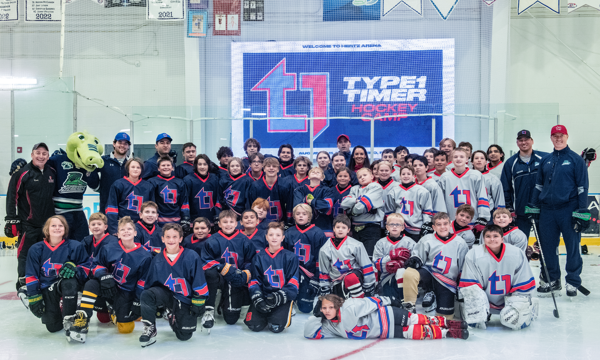“It’s something that impacts the entire family, so we wanted to create a camp and an experience where we could bring those two passions together,” Geoff Hoffman said. “It’s been really exciting to see the momentum and feedback based on the experiences that people have had at the camp.”
Type 1 diabetes is a chronic condition in which the pancreas makes little to no insulin, a hormone the body uses to allow sugar to enter cells and produce energy. Type 1 diabetes has no cure and treatment is directed toward managing the amount of sugar in the blood using insulin and maintaining a healthy lifestyle to prevent complications.
The camp has taken place the past two years in Estero, Florida, at the Hertz Arena, home of the ECHL’s Florida Everblades.
“We thought it was an opportunity to create a unique camp experience for hockey players who live with Type 1 diabetes,” Megan Hoffman said. “A lot of times these kids are the only ones on their hockey team with Type 1 diabetes. So bringing these kids together not only makes them feel like they’re not alone, but they also learn a lot from each other, they develop friendships and learn about managing Type 1 diabetes while playing a sport like hockey.”
There were 30 players at the first camp and participation doubled to 60 players this past year.
“We want to try and bring together as many people that are impacted by Type 1 diabetes and that have a passion for hockey as we possibly can,” Geoff Hoffman said.
The camp is a combination of on- and off-ice activity, in addition to education components and family-fun activities.
Professional coaches and personnel are also on hand for the camp.
Kevin Delaney, the skating and skills development instructor for the Chicago Blackhawks, works with campers, in addition to Brad Ralph, head coach of the Florida Everblades and Ernie Hartlieb, a retired Everblades forward.
“We take our hockey seriously and we bring in professional coaches,” Geoff Hoffman said. “They’re high-profile instructors who are hard to find in any scenario. We have so many different people who have gone through a tremendous effort to make this come to life.”
On top of the on-ice instruction, there’s a medical staff monitoring the health and safety of all the participants. There’s also an educational panel for parents and caregivers to discuss nutrition, mental health, diet and exercise while living with Type 1 diabetes.
“It’s a team effort and we couldn’t do it without each and every one of them,” Megan Hoffman said. “A lot of people donate their time and efforts and that’s really what is able to help us pull this off.”
Current San Jose Sharks center Luke Kunin and his wife, Sophia, were special guests at the camp this year.
Kunin was diagnosed with Type 1 diabetes at age 12. Since then, he went on to become the captain at the University of Wisconsin, a first-round pick and a six-year NHL veteran by 25.
“Henry was really fortunate when he was diagnosed because he met Luke when he was at Wisconsin, and the first question he asked him was if he could still play hockey,” Megan Hoffman said.
Kunin’s parents were at the inaugural camp, while Luke and Sophia attended this past year. One of the evenings, Kunin was a keynote speaker at an off-ice event, and he spent time talking to parents, signing autographs and taking photos with the players.
“The impact he made on all of our players and their families, you can’t put a price on it,” Megan Hoffman said. “It was inspiring for those kids to hear his story about how he overcomes and continues to persevere every day. We were thrilled to have him, and we hope he comes back next year.”
Registration for next year’s camp is open to boys and girls, ages 8-16, who are living with Type 1 diabetes and have a love for hockey. Additional information can be found at www.t1thockey.com.
“We have staff members who can reach out if anybody has any questions,” Geoff Hoffman said. “We’re just trying to get the word out to as many people as we can.”
Story from Red Line Editorial, Inc.



